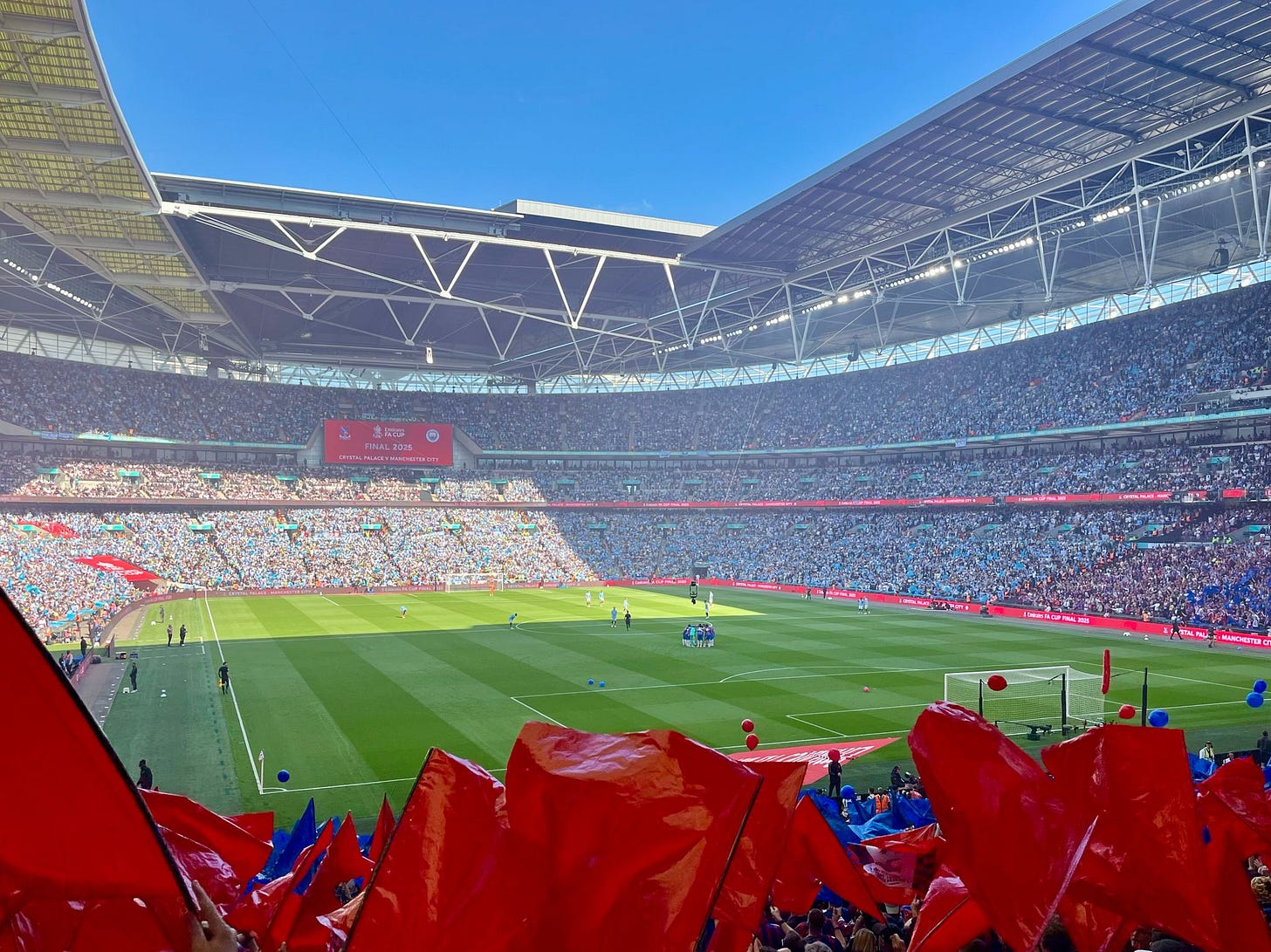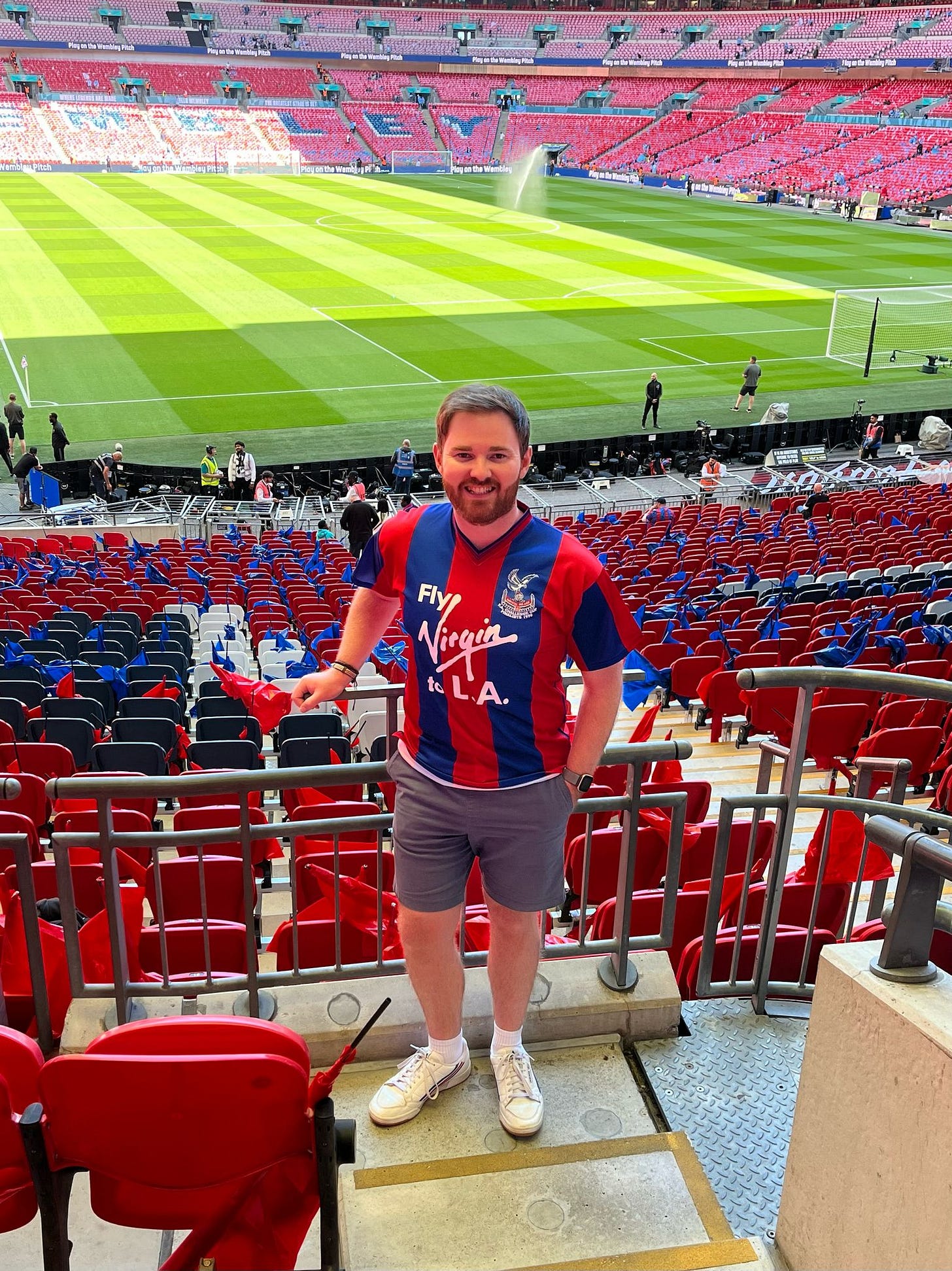Why Crystal Palace’s triumph is a win for English football and the FA Cup
The Eagles have landed on silverware, and it proves you don't have to be part of the establishment to make history.
“Crystal Palace: FA Cup winners.”
It’s not a sentence that I ever imagined writing about my football club. After two FA Cup final defeats to Manchester United in 1990 and 2016, I had long since accepted that our story would be one of near-misses — a lot of chapters without an ending. However, on Saturday, thousands of us felt something that no Palace fan had ever felt before: the joy of watching our team win a major trophy.
As the final whistle blew on our 1-0 victory over Manchester City, there was near-universal delight for the Davids socking one to the Goliaths. It was joyous. It is joyous.
Elephant in the room: it was not the EFL. But nor was it the Premier League. I’m aware that you might not expect to see Crystal Palace on NTT20.COM, but my club’s journey and destination are a tonic for pessimism. At a time when the last six promoted Championship teams have all been immediately relegated, cynicism about the state of the pyramid is not misplaced. But perhaps the FA Cup winners in 2025 give us a foothold for optimism in the future.
While Palace may be an established top-flight team in 2025, we are anything but ‘establishment’. We have far more in common with the budgets, grounds and fanbases of the leagues below than with the state-owned entities above.
Our chairman and co-owner, Steve Parish, is a lifelong Crystal Palace fan. We have one of the smallest wage budgets in the league. And we’re never at risk of breaching the infamous Profit & Sustainability Rules. We are a humble club with much to be humble about.
The Journey and the EFL
The journey to an FA Cup win started in the EFL. In the 2013 Championship Play-Off Final, Joel Ward headed Fernando Forestieri’s goal-bound effort off the line in the dying minutes of a match that we won 1–0. Twelve years, and hundreds of appearances later, Joel Ward lifted one of the most iconic trophies in world football.
Since then, Crystal Palace have developed a reputation for identifying the best talent from within the EFL (sorry not sorry). The goalscorer on Saturday, Ebere Eze, came from QPR via Wycombe and Millwall. The penalty-saver, Dean Henderson, had loan spells at Stockport, Grimsby, Shrewsbury and Sheffield United. Our key central midfielder, Adam Wharton, arrived from Blackburn. Go back further and the departed Michael Olise, who has just won the Bundesliga with Bayern Munich, joined Palace from Reading.
Did our former player, manager, and sporting director, Dougie Freedman, listen to Ali and George evangelising about some of the aforementioned players on the pod? I can neither confirm nor deny it. But aside from the signings, our recruitment has not been simply about the league that you play in; it has been about where you come from. Several players are from South London or elsewhere in the capital. That homegrown feel to the side has grown not only through signings, such as Marc Guehi and Eddie Nketiah, but through the academy, in Nathaniel Clyne and Tyrick Mitchell.
Of course, there have also been seasons where it hasn’t been particularly exciting. Finishing somewhere between 10th and 14th, year after year, can be rather monotonous, especially without a cup run to break it up. And of course, when you’re not one of the big clubs, you have to sell some of your biggest assets. But – and many EFL clubs have similar stories – we should be proud of the fact that we used the Aaron Wan-Bissaka transfer fee paid by Manchester United to build a state-of-the-art academy.
The reality is that if you're a club without mega-rich owners, growth has to be gradual. In an era when the Premier League is awash with money and everyone wants instant success, incremental growth isn’t particularly sexy — but maybe it should be.
Success in increments
My first trips to Selhurst Park were at the back end of the 1997/98 Premier League season, at a time when we had already been relegated. In the years that followed, I lived through two administrations, stared down relegation to the third tier (twice), suffered play-off heartbreak (twice), and saw our best players sold for peanuts more times than I care to mention.
There was a promotion in 2004, swiftly followed by a relegation in 2005. By the time we returned to the top flight in 2013 and actually stayed in it in 2014, we had cycled through a who’s who of names on the manager’s door: Holloway, Freedman, Burley, Warnock, Taylor, Dowie, Francis etc. None of them, and nothing that came before (the ‘Team of the Eighties’, Wright and Bright, Attilio Lombardo) or after (the Wilfried Zaha years), has made our fans feel entitled to win anything. And perhaps that’s the great separator between the haves and the have-nots.
When you support a mid-table Premier League team, nights like Crystanbul, little achievements like doing the double over your rivals, milestones like beating every established top-flight team home and away, five (soon to be six) trips to Wembley, and — of course — one FA Cup are hard-earned. But doesn’t that make them all the sweeter?
Videos of Palace fans celebrating at full-time on Saturday have gone viral. The cheers, the tears, the hugs with loved ones. Those videos are popular not because they’re of Palace fans: it’s because they’re of football fans who had followed their club through thick and thin, never thinking they would see a moment like this.
Whether you’re a Leeds or Burnley fan, a Sheffield United or Sunderland fan, or even a fan of another Championship club, I hope that you watched Saturday’s game and thought, That could be us. It might take five years. It might take ten. It might take fifteen — but yes, that could be you.
There’s no getting away from it: establishing yourself in the Premier League is tougher than it’s ever been. Even if you manage it, it won’t be pretty. You’ll have to suffer. The spending of other clubs? Maddening. The entitlement of certain fanbases? Infuriating. The constant spectre of VAR? Sickening. But magical days like Saturday — and the Thursday nights to come next season — make it all worthwhile.
Will there be another Leicester City 2015/16? Possibly not. Will there be another Crystal Palace 2024/25? Absolutely. And, hopefully, that also brings with it a renewed sense of value amongst all fans for the FA Cup.




